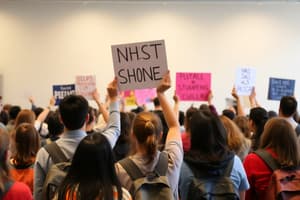Podcast
Questions and Answers
What did the Supreme Court rule in Tinker v. Des Moines?
What did the Supreme Court rule in Tinker v. Des Moines?
- Students can only speak during designated times.
- Students have no rights to free speech in schools.
- Schools can control all aspects of student communication.
- Students can express their free speech as long as it is not disruptive. (correct)
The Fourth Amendment protects students from any search and seizure in schools.
The Fourth Amendment protects students from any search and seizure in schools.
False (B)
In which year did the Supreme Court rule on Tinker v. Des Moines?
In which year did the Supreme Court rule on Tinker v. Des Moines?
1969
The practice of ________ punishment is currently permitted in 18 states in the US.
The practice of ________ punishment is currently permitted in 18 states in the US.
Match the following amendments with their associated student rights:
Match the following amendments with their associated student rights:
What is a key concern related to the increase in police presence in schools?
What is a key concern related to the increase in police presence in schools?
Corporal punishment has been banned entirely in public schools across the United States.
Corporal punishment has been banned entirely in public schools across the United States.
Which amendment was violated when police in school did not clarify a student's right to remain silent?
Which amendment was violated when police in school did not clarify a student's right to remain silent?
The lack of clear guidelines for balancing student rights with teaching missions poses a ________ for educators.
The lack of clear guidelines for balancing student rights with teaching missions poses a ________ for educators.
Which states account for over 70% of corporal punishment cases?
Which states account for over 70% of corporal punishment cases?
Flashcards
Student Free Speech Rights
Student Free Speech Rights
High school students have some free speech rights, but they can be limited if they disrupt the learning environment.
School Searches
School Searches
School officials can search students without a warrant if there's reasonable suspicion.
Student's Fifth Amendment Rights
Student's Fifth Amendment Rights
Students have the right to remain silent and must be informed of this right by police in schools.
School to Prison Pipeline
School to Prison Pipeline
Signup and view all the flashcards
Corporal Punishment in Schools
Corporal Punishment in Schools
Signup and view all the flashcards
Disproportionate Impact of Corporal Punishment
Disproportionate Impact of Corporal Punishment
Signup and view all the flashcards
Balancing Student Rights and Learning
Balancing Student Rights and Learning
Signup and view all the flashcards
Supreme Court Cases & Student Rights
Supreme Court Cases & Student Rights
Signup and view all the flashcards
Unclear Guidance for Educators
Unclear Guidance for Educators
Signup and view all the flashcards
Fourth Amendment Rights
Fourth Amendment Rights
Signup and view all the flashcards
Study Notes
Student Rights and US Constitution
- The US Constitution guarantees certain rights to American citizens, but the question still remains of whether these are equally applied to students.
- The US Supreme Court has tackled this question with numerous cases, but it remains murky.
- The Supreme Court in Tinker v. Des Moines (1969) affirmed that high school students have the right to free speech, but upheld the ability of school administrators to restrict it when it disrupts the learning environment.
- This decision has been interpreted to mean students maintain some free speech rights, but it does not extend to situations where the speech is considered disruptive, offensive, or in violation of specific school regulations.
- The Supreme Court has also ruled that school officials can search students' belongings and require random drug tests without a warrant or probable cause, if reasonable suspicion exists. This has been a point of contention for many as it has been viewed as a violation of students' Fourth Amendment right against unreasonable searches and seizures.
- A 2011 Supreme Court ruling found that police in school violated a student's Fifth Amendment rights by not clarifying if they understood the right to remain silent.
- The implications of the Supreme Court’s decisions have been debated, as they may lead to an increase in police presence in schools. This has been a significant issue with regard to the growing “school to prison pipeline” and disproportionately impacts students of color.
- Corporal punishment, though banned as a form of punishment in the U.S. military in 1862 and outlawed by states in the 1970s, has been upheld by the Supreme Court for students in public schools.
- While 18 states in the US currently permit corporal punishment, it is more concentrated in the south; five southern states account for over 70% of cases.
- This practice continues to be a source of debate and concern given its disproportionate impact on students of color.
- It's a big challenge for schools without a clear answer; there's no real guidebook for educators on how to balance kids' rights with their teaching mission.
Studying That Suits You
Use AI to generate personalized quizzes and flashcards to suit your learning preferences.




